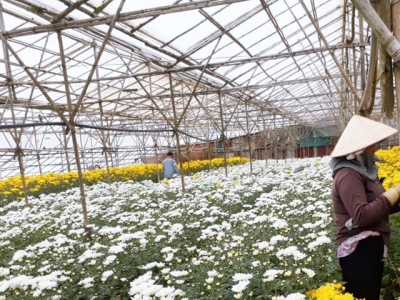BASFs light stabiliser for greenhouse films helps Vietnamese farmers

BASF and Tan Hung Co Masterbatch Manufacture Co.are working to help farmers increase their yield and save resources with more durable greenhouse films.
BASF and Tan Hung Co contribute to Vietnam's call for solutions in high-tech agriculture
Tan Hung Co, a leading manufacturer of additive masterbatches for plastic films in Vietnam, is now using BASF’s plastic additive Tinuvin® NOR™ 371 to increase durability and the lifespan of plastic greenhouse films made from low-density polyethylene. With Tinuvin NOR 371, greenhouse films can withstand weathering for at least three to four years.
The government of Vietnam has announced a VND100 trillion (approximately $4.35 billion) package to develop hi-tech agriculture. Better flower and fruit varieties are being developed, and field production is gradually moving towards protected cultivation, precision, and automatic irrigation, computerised crop management systems, and applying greenhouse technologies.
To get the most out of greenhouse technologies, light stabilisers need to be added to the polymer during the manufacturing of greenhouse films. These stabilisers make the films resistant to the intense sunlight and heat that develops at the contact points with the metallic greenhouse frame. Without them, plastic films can become brittle and break within a few weeks.
“Natural weathering conditions affect the durability of polymers used outdoors, and greenhouse film poses an additional challenge because of the crop protection agents used in greenhouses,” said Hermann Althoff, senior vice president of BASF’s Performance Chemicals unit in the Asia-Pacific. “Our Tinuvin NOR 371 light stabiliser lives up to the greenhouse challenge and extends the useful film life, thus reducing costs for the growers and waste for the environment.”
Tinuvin NOR 371 provides durability to greenhouse films by preventing degradation from ultraviolet (UV) rays, thermal stress, and oxidation. With durable films that last for several seasons, farmers can cover greenhouses for growing chrysanthemums, roses, and strawberries for the export market – thereby increasing yields of profitable crops, while saving resources and reducing waste.
Additionally, Tinuvin NOR 371 helps to ensure that greenhouse films can be used in a variety of growing conditions. Although the sulphur compounds approved as agricultural products to prevent and combat fungal diseases are ecologically safe, chemically they deactivate the light stabilisers and accelerate their breakdown.
To counter this deactivation of light stabilisers, stabilisers for greenhouse films – based on BASF’s NOR technology – are added which are particularly resistant to sulphur compounds and other agrochemicals. As a result, Tinuvin NOR 371 offers stability that enables farmers to produce profitably for several growing seasons.
Related news
 Lộc Trời Group and Tấn Vương Food JSC to export 84,000 tonnes of rice to China
Lộc Trời Group and Tấn Vương Food JSC to export 84,000 tonnes of rice to China Lộc Trời Group and Tấn Vương Food Joint Stock Company will export 84,000 tonnes of rice per year to China.
 Firm helps Laos build livestock information system for epidemic control
Firm helps Laos build livestock information system for epidemic control Build a herd management and information system for urgent epidemic prevention through smart phones, amidst the spreading African swine fever in the region.
 Rice export decline highlights need for strategy shift
Rice export decline highlights need for strategy shift Rice producers and exporters must professionalize investment in accordance with market demand and adopt appropriate production orientation in light of declining